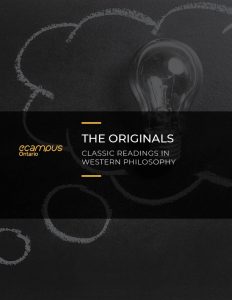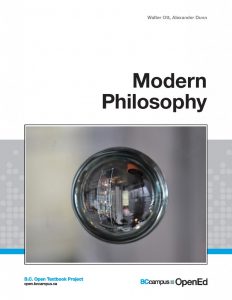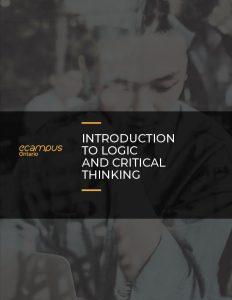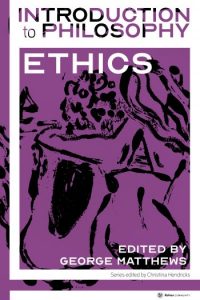Faculty of Arts
Philosophy
The Originals: Classic Readings in Western Philosophy
By: Jeff McLaughlin, Thompson Rivers University
 This peer-reviewed, open textbook provides readers with an appreciation and understanding of philosophy framed by the very words and ideas of those who have shaped our thinking over the centuries.
This peer-reviewed, open textbook provides readers with an appreciation and understanding of philosophy framed by the very words and ideas of those who have shaped our thinking over the centuries.
Includes: primary source documents.
Attribution: The Originals: Classic Readings in Western Philosophy by Jeff McLaughlin is licences under a Creative Commons Attribution (CC BY) 4.0 International License.
An Introduction to Philosophy
By: W. Russ Payne, Bellevue College
 This peer-reviewed open textbook presents philosophy to newcomers as a living discipline with historical roots. Early chapters are historically organized, to help trace a developmental progression of thought that introduce basic philosophical methods and frames issues that remain relevant today.
This peer-reviewed open textbook presents philosophy to newcomers as a living discipline with historical roots. Early chapters are historically organized, to help trace a developmental progression of thought that introduce basic philosophical methods and frames issues that remain relevant today.
Includes: instructor resources.
Attribution: An Introduction to Philosophy by W. Russ Payne is licensed under a Creative Commons Attribution Non-Commercial (CC BY-NC) 4.0 International License.
Analyzing Meaning: An Introduction to Semantics and Pragmatics
This open textbook provides an introduction to the study of meaning in human language, from a linguistic perspective including foundational concepts, word meanings, implicature (including indirect speech acts), compositional semantics, modals, conditionals, and causation and tense & aspect.
Includes: instructor resources.
Modern Philosophy
By: Walter Ott and Alex Dunn
 This well reviewed open textbook in modern philosophy combines readings from primary sources with two pedagogical tools.
This well reviewed open textbook in modern philosophy combines readings from primary sources with two pedagogical tools.
Attribution: Modern Philosophy by Walter Ott and Alex Dunn is licensed under a Creative Commons Attribution Non-Commercial ShareAlike (CC BY-NC-SA) 4.0 International License.
Words of Wisdom: Intro to Philosophy
By: Jody Ondich, Lake Superior College
 Words of Wisdom can come from anyone. In this text we discuss topics ranging from “Are Humans good by nature?” to “Is there a God?” to “Do I have the right to my own opinion?” Philosophy is the study of wisdom, and can emerge in our conversations in social media, in school, around the family dinner table, and even in the car. The text uses materials that are 2,500 years old, and materials that were in the news this year. Wise people come in all shapes and types, and from every culture on earth. We have poetry and folktales, sacred writings and letters. Dialogues and interviews, news columns, Ted Talks, You Tube recordings and even comedy are all a part of the content in this text.
Words of Wisdom can come from anyone. In this text we discuss topics ranging from “Are Humans good by nature?” to “Is there a God?” to “Do I have the right to my own opinion?” Philosophy is the study of wisdom, and can emerge in our conversations in social media, in school, around the family dinner table, and even in the car. The text uses materials that are 2,500 years old, and materials that were in the news this year. Wise people come in all shapes and types, and from every culture on earth. We have poetry and folktales, sacred writings and letters. Dialogues and interviews, news columns, Ted Talks, You Tube recordings and even comedy are all a part of the content in this text.
Attribution: Words of Wisdom: Intro to Philosophy by Jody Ondich is licensed under a Creative Commons Attribution Non-Commercial ShareAlike (CC BY-NC-SA) 4.0 International License.
Logic and Critical Thinking
Introduction to Logic and Critical Thinking
By: Matthew J. Van Cleave, Lansing Community College
 This is an introductory textbook in logic and critical thinking, aimed at providing the reader with a set of tools and skills that will enable them to identify and evaluate arguments.
This is an introductory textbook in logic and critical thinking, aimed at providing the reader with a set of tools and skills that will enable them to identify and evaluate arguments.
Includes: exercises.
Attribution: Introduction to Logic and Critical Thinking by Matthew J. Van Cleave is licensed under a Creative Commons Attribution (CC BY) 4.0 International License.
A Concise Introduction to Logic
Concise Introduction to Logic is an introduction to formal logic suitable for undergraduates taking a general education course in logic or critical thinking, and is accessible and useful to any interested in gaining a basic understanding of logic.
Introduction to Philosophy: Ethics
By: George Matthews, Plymouth State University and Christina Hendricks, University of British Columbia
 This text examines some of the main threads of discussion on judgments about good and bad, right and wrong. It considers basic questions about moral and ethical judgment: Is there such a thing as something that is really right or really wrong independent of time, place and perspective? What is the relationship between religion and ethics? How can we reconcile self-interest and ethics? Is it ever acceptable to harm one person in order to help others?
This text examines some of the main threads of discussion on judgments about good and bad, right and wrong. It considers basic questions about moral and ethical judgment: Is there such a thing as something that is really right or really wrong independent of time, place and perspective? What is the relationship between religion and ethics? How can we reconcile self-interest and ethics? Is it ever acceptable to harm one person in order to help others?
Attribution: Introduction to Philosophy: Ethics by George Matthews and Christina Hendricks is licensed under a Creative Commons Attribution (CC BY) 4.0 International License.
Public Domain Resources
Any works that are in the Public Domain (creative works to which no exclusive intellectual property rights apply) can be freely used in your courses. These texts can be hosted at Ryerson and customized (introductions, glossaries, annotations, supplementary materials) for your course.
Examples: Autobiography of Alice B. Toklas, Tartuffe
Project Gutenberg
Project Gutenberg is a library of over 60,000 free eBooks that is a great resource for finding out-of-copyright works. Project Gutenberg eBooks are mostly older literary works, published before 1924.
Contact your subject librarian for more information on finding and using public domain works.
If you have questions about Open Educational Resources in your subject area, please contact your subject liaison librarian.

